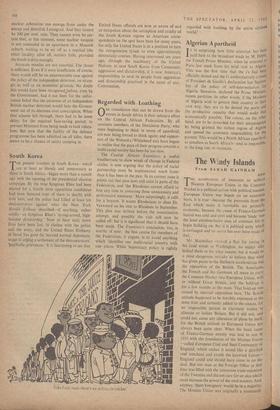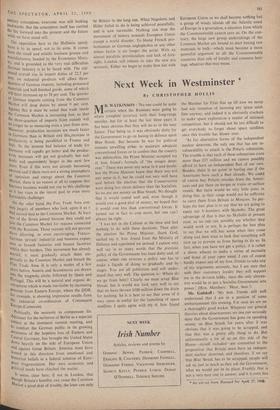The Windy Islands
From SARAH GAINHA\1 THE acceleration of measures to achieve Western European Union in the Common Market is a political action with political reasons. European Union was begun on an economic basis, it is true—because the pressures from the East which make it inevitable are primarily economic, because the cause of Franco-German hatred was coal and steel and because 'trade' was the least emotion-laden area of common life to begin building on, But it is political unity which is envisaged and no secret has ever been made of that.
Mr. Macmillan ,:howed a flair for timing in his loud words in Washington, no matter who leaked them or for what reason: but it would be a most dangerous mistake to believe that what has given pause to the Hallstein'accelerations was the opposition of the British. The Americans, the French and the Germans all mean to carry the Common Market into European Union, with or without Great Britain, and the hold-up li for a few months at the most. That hold-up was caused by internal opposition here. The British attitude happened to be forcibly expressed at the same time and certainly added to the unease, for no responsible person in Germany wishes to alienate or isolate Britain. But it did not, and could not, cause any alteration of plans by itself, for the British attitude to European Union has always been quite clear. When the basic cause of Franco-German enmity was laid to rest in 1951 with the foundation of the Montan Union —called European Coal and Steel Community in England, which makes it sound like a glorified coal merchant and avoids the keyword Union— England could and should have come in on the deal. But our man at the Foreign Office at that time was filled with the rancorous trade-unionism of the Twenties and did not care for an idea which must increase the power of the steel masters. And, anyway, 'them foreigners' would be in a majority. The Montan Union was originally a nineteenth- century conception; everyone was still looking backwards. But the conception itself has carried the Six forward into the present and the future while we have stood still.
, The opposition here to the Hal!stein speed- burst is to its speed, not to its aims. It comes Iron) the small and middle business groups and Manufacturers, headed by the Economics Minis- try, and is grounded in the very real difficulties German industry is to be faced with. The esti- mated overall rise in import duties of 22.5 per cent. on industrial products will affect three- quarters of German imports, including processed materials and half-finished goods, some of which will have increases up to 58 per cent. The quarter °I German imports coming from the Common Market will drop duties by about 9 per cent. Against this it must be noted that trade inside the Common Market is increasing fast, so that the three-quarters of imports from outside will no longer be so menacing even a year from now. Moreover, production increases are much faster in Germany than in Britain and this increase in Productivity is being paralleled in France and Italy. So the present bad balance of trade for Germany will rapidly get better and the produc- tivity increases will get not gradually but sud- denly and enormously larger in- the next few Years- Even if this were not already becoming °bvious and if there were not a strong atmosphere °I optimism and energy about the Common Market, there is no reason at all to suppose that German business would not rise to this challenge as it has risen in the recent past to even more formidable challenges On the other hand, the Free Trade Area con- sists largely of members who look upon it as a had second-best to the Common Market. At least two of the Seven joined because they could not j°in the Common Market for reasons connected with the Russians. Those reasons will not prevent them allowing, or even encouraging, Franco- German 'private' industrial and business expan- si°n as branch factories and licence factories Within their borders. This movement has already started; it must gradually attach them em- pirically to the Common Market and breach the Free Trade Area. It is only a matter of a few Years before Austria and SCandinavia are drawn into the magnetic circle, followed by Spain and Portugal. This will be a natural and organic de- velopment which is made inevitable by increasing Pressure from Eastern Europe, where the DDR. for example, is showing impressive results from the industrial co-ordination of Communist c.uroPc (Comecon).
Politically, the necessity to compensate Dr. Adenauer for the inclusion of Berlin as a separate subject at the imminent summit meeting, and t° comfort the German public in its growing awareness of the hopeless loss of Eastern and Central Germany, has brought the United States down heavily on the side of European Union and against Great Britain. America must have leaned in this direction from emotional and historical beliefs in a federal solution of Euro- pean fragmentation. Her own economic and Political needs have clinched the matter.
It seems clear here, if not in London, that though Britain's hostility can cause the Common Market a good deal of trouble, the loser can only be Britain in the long run. What. Napoleon and Hitler failed to do is being achieved peacefully, and is now inevitable. Nothing can stop the movement of history towards European Union except a world disaster. To blame French pro- tectionism or German anglophobia or any other minor factor is no longer the point. With an almost paralytic provincialism and lack of fore- sight, London still refuses to take the new era seriously. Either we begin to make firm ties with European Union or we shall become nothing but a group of windy islands off the Atlantic coast of Europe in a generation, a situation from which the Commonwealth cannot save us. On the con- trary, the large new group undertakings of the Common Market are bound to start buying raw materials in bulk—which must become a more powerful argument to all the Commonwealth countries than talk of loyalty and common heri- tage, whatever that may mean.











































 Previous page
Previous page